Parents are considered to be the guiding force in every child’s life. They are the primary caregivers, the ones who teach us the values of life, and help us shape our personalities. However, not all parents are perfect, and some can have a toxic impact on their children’s lives. Moreover, there are several types of toxic parents.
So, who are toxic parents? Toxic parents are those who have a negative impact on their children’s lives, either through their behavior or their actions. They can cause emotional, psychological, and sometimes even physical harm to their children.
In this article, we are going to talk about the signs of toxic parenting, different types of toxic parents and how they have an impact on their children. We will examine the various behaviors and actions that toxic parents can exhibit, provide insights on how to recognize them, and also give tips for dealing with toxic parents.
Related: 10 Things Toxic Parents Say And What They Actually Mean
Signs Of Toxic Parenting
Recognizing toxic parents can be challenging, especially if you have grown up with their behavior.
Some signs of toxic parents include:
- Belittling or demeaning behavior
- Physical or emotional abuse
- Ignoring or neglecting children’s needs
- Over-involvement in children’s lives
- Unrealistic expectations
- Manipulation and control
- Substance abuse or addiction
- Micromanaging or restrictive behavior
- Comparing children to others
- Dismissing children’s feelings and needs
- Playing favorites among children
- Using guilt as a means of control
- Refusing to apologize or take responsibility for their actions
- Constantly criticizing or nagging
- Refusing to respect boundaries and personal space
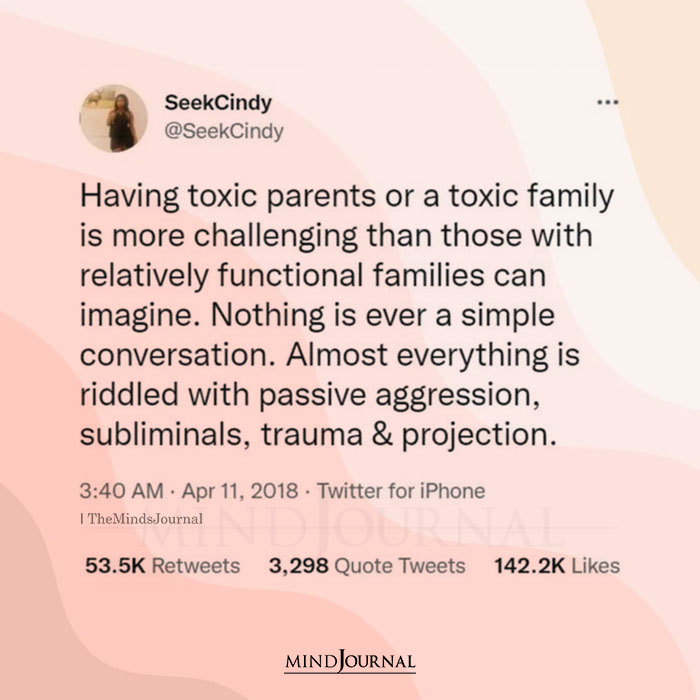
Now, that we have discussed the signs of toxic parenting, let’s find out what are the different types of toxic parents.
16 Types Of Toxic Parents
1. The Narcissistic Parent
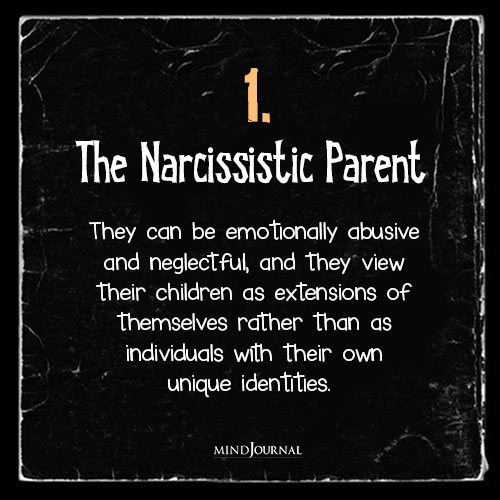
Narcissistic parents can be emotionally abusive and neglectful, and they tend to view their children as extensions of themselves rather than as individuals with their own unique identities.
They often use their children to meet their own emotional needs, such as feeling important or powerful and can become envious or jealous of their children’s accomplishments or attention from others.
Narcissistic parents can exhibit a range of harmful behaviors, such as disregarding their children’s feelings, dismissing their opinions, and manipulating or exploiting them for their own gain.
They may also be overly critical, demanding, and controlling, setting unrealistic expectations and punishing their children when they fail to meet them.
Children of narcissistic parents often struggle with low self-esteem, feelings of inadequacy, and a lack of boundaries. They may also experience anxiety, depression, and difficulties forming healthy relationships later in life.
In some cases, they may even internalize their parents’ abusive behaviors and become narcissistic themselves.
2. The Abusive Parent
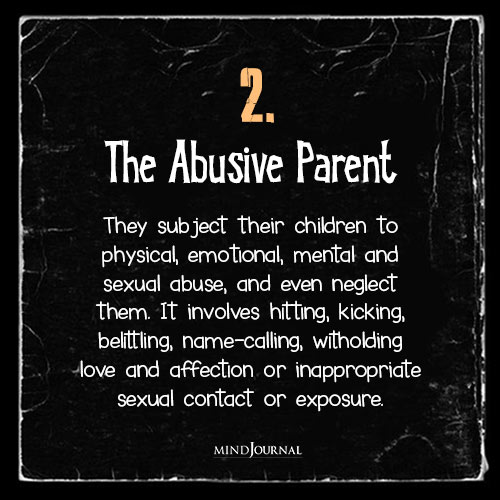
Abusive parenting can take many forms, including physical, emotional, and sexual abuse, as well as neglect. Physical abuse includes kicking, hitting, and even throwing objects, while emotional abuse includes name-calling, belittling, and withholding love and affection.
Sexual abuse can include any unwanted or inappropriate sexual contact or exposure. Neglect can involve failure to provide for a child’s basic needs, such as food, shelter, or medical care.
Children of abusive parents often struggle with the long-lasting effects of their trauma, including depression, anxiety, and PTSD. They may also struggle with issues of self-worth, trust, and forming healthy relationships, be it romantic relationships or friendships.
Related: 10 Types Of Toxic Mothers Who Only Know How To Hurt Their Child
3. The Neglectful Parent
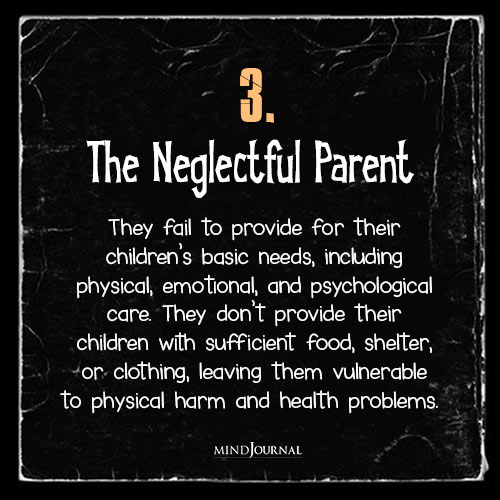
Neglectful parenting is characterized by a failure to provide for a child’s basic needs, including physical, emotional, and psychological care. Neglectful parents may not provide their children with sufficient food, shelter, or clothing, leaving them vulnerable to physical harm and health problems.
Additionally, these parents may be emotionally distant, failing to give their children the love and support they need to thrive. Even though they are “parents”, they could care less about their children and their well-being.
The impact of such type of toxic parenting behaviours can be devastating, leading to a range of negative outcomes for children. They may suffer from poor physical and mental health, struggle with self-esteem and relationships, and experience difficulty in school or other settings.
Children who grow up with neglectful parents may also struggle with addiction and other destructive behaviors, as they try to cope with the pain and trauma of their childhood experiences.
4. The Enmeshed Parent
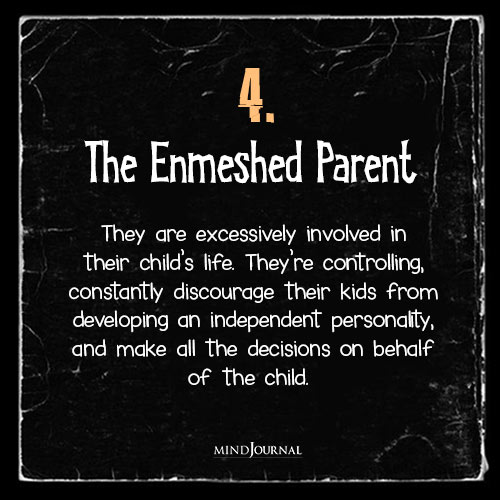
Enmeshed parenting is a style where a parent is excessively involved in their child’s life, which can lead to an unhealthy dynamic. Such parents can be controlling, constantly discourage their kids from developing an independent personality, and may even make all the decisions on behalf of the child.
Children raised by enmeshed parents often struggle to set healthy boundaries and may develop codependent tendencies.
This parenting style can have long-term consequences on a child’s emotional, psychological, and social development. Children raised by enmeshed parents may struggle with anxiety, low self-worth, and difficulty forming meaningful and healthy relationships when they grow up.
As they become adults, they may struggle with decision-making, setting boundaries, and establishing their own identities.
5. The Perfectionist Parent
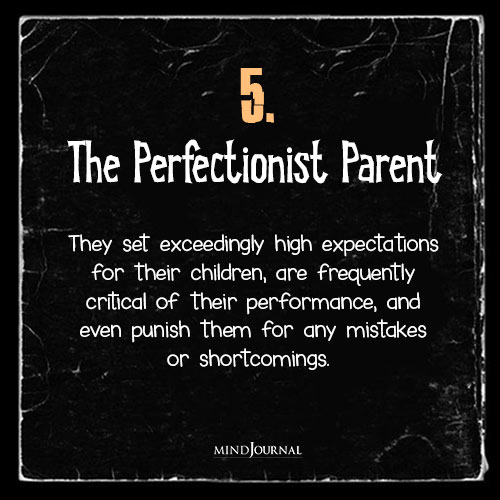
What is toxic parenting? This!
Perfectionist parents are those types of toxic parents who set exceedingly high expectations for their children, are frequently critical of their performance, and even punish them for any mistakes or shortcomings.
This type of parenting can be detrimental to a child’s emotional well-being, causing them to experience anxiety, loss of self-confidence, and fear of failure.
Children raised by perfectionist parents end up suffering from low self-esteem, feelings of inadequacy, and experience difficulties with self-worth.
The pressure to meet unattainable standards can also lead to severe mental health issues such as depression and anxiety. Moreover, such children may become risk-averse and avoid new challenges, fearing failure.
Related: 8 Things Parents Do That Keep Children From Succeeding
6. The Manipulative Parent
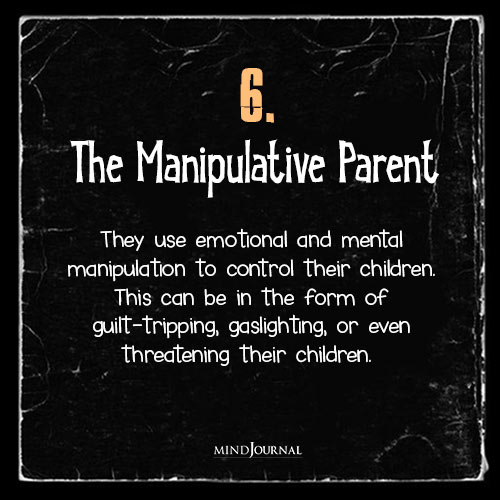
Manipulative parents use emotional manipulation to control their children. This can be in the form of guilt-tripping, gaslighting, or even threatening their children. Children raised by manipulative parents may develop trust issues and struggle to form healthy relationships.
Such a type of parenting can have long-term consequences on a child’s emotional and psychological well-being. Children may end up developing self-esteem issues, crippling anxiety, and even show signs of depression.
They may also struggle with decision-making and experience difficulties in establishing healthy boundaries, even after turning adults.
7. The Addicted Parent
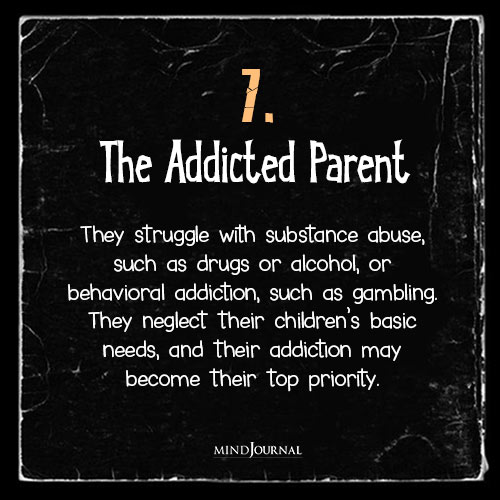
Parental addiction is a devastating problem that can have dangerous consequences for children.
An addicted parent is someon who struggles with alcohol or drug use, or both, or other kinds of addiction, such as gambling. They may neglect their children’s basic needs, and their addiction may become their top priority, causing significant emotional and psychological harm to their children.
Children raised by addicted parents may experience trauma, trust issues, parentification, and even depression. They end up struggling with emotional regulation and have difficulties establishing healthy relationships.
Moreover, children of addicted parents are more likely to develop addiction problems themselves, due to genetic, environmental, and psychological factors.
8. The Controlling Parent
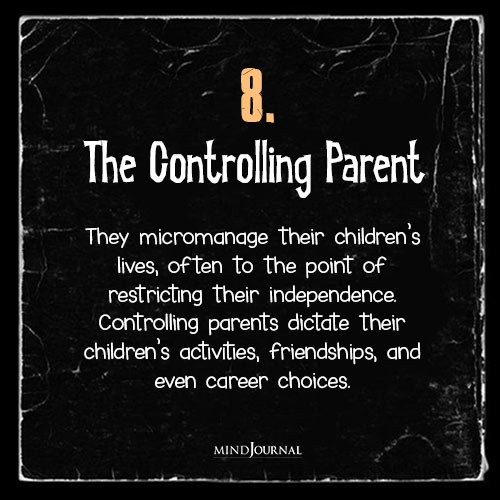
Controlling parents are those types of toxic parents who micromanage their children’s lives, often to the point of restricting their independence. Controlling parents may dictate their children’s activities, friendships, and even career choices.
Children raised by controlling parents often struggle with decision-making and may have difficulty asserting their independence.
Controlling parenting can have long-term consequences on a child’s emotional, mental, and psychological well-being. Their children end up suffering from low self-esteem and struggle with making important decisions independently. Even after turning adults, they depend on their parents for making all decisions for them.
They suffer from a severe lack of autonomy and independence and may even grow up to be mentally and emotionally fragile.
9. The Competitive Parent
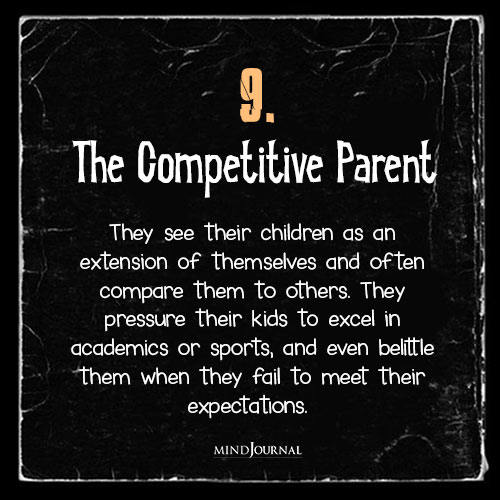
Competitive parents are those types of toxic parents who see their children as an extension of themselves and often compare them to other children. They may pressure their children to excel in academics or sports, and even belittle them when they fail to meet their expectations.
Children raised by competitive parents often grow up to be under-confident and may struggle with feelings of not being good enough.
They never get to understand the concept of healthy competition and its importance since their parents have always instilled in them that winning is everything. Such parents never help their children develop a growth mindset, and obsessively focus on perfection instead of progress.
Competitive parents don’t model positive and healthy behaviors, nor do they teach their children the importance of giving their 100%. They only believe that either you are a winner or a loser.
Related: How Toxic Fathers Affect Their Daughters Into Adulthood
10. The Dismissive Parent
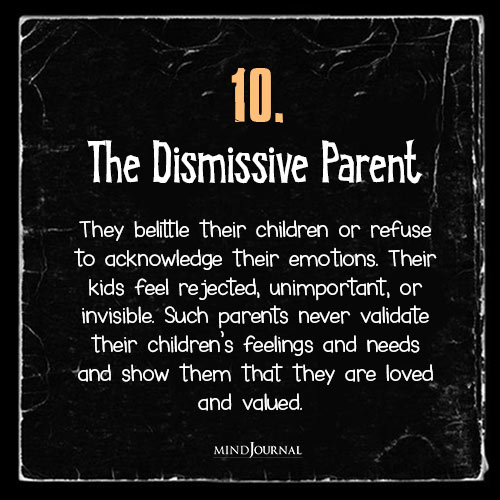
As the name suggests, a dismissive parent dismisses their children’s needs and feelings. These parents may belittle their children or refuse to acknowledge their emotions. Children raised by dismissive parents often develop attachment issues and may struggle with forming healthy relationships in the future.
Dismissive parenting can make children feel rejected, unimportant, or invisible, leading to low self-esteem and self-worth. Moreover, children may struggle with trusting others and forming secure attachments, leading to difficulties in relationships throughout their lives.
Such toxic parents never validate their children’s feelings and needs nor do they show them that they are loved and valued. They don’t believe in open and transparent communication with their children, rather they always ignore them and their feelings.
11. The Lawnmower Parent
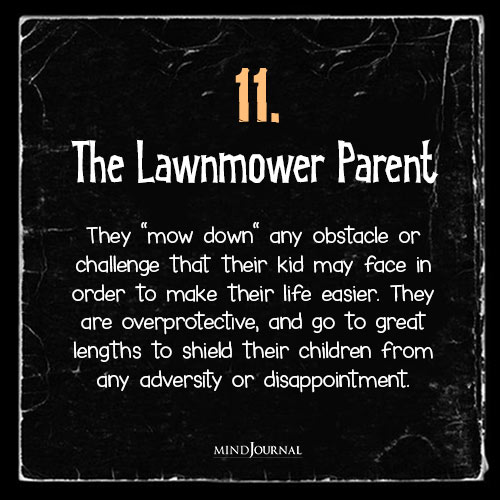
Lawnmower parenting is a style where parents “mow down” any obstacle or challenge that their child may face in order to make their child’s life easier. Lawnmower parents take an overprotective approach to parenting, and they may go to great lengths to shield their children from any adversity or disappointment.
They often anticipate and prevent any problem or setback their child may encounter, such as intervening with teachers or coaches on their child’s behalf or doing their child’s school work for them.
They may also shield their child from the consequences of their actions, such as calling in sick for them or paying for their mistakes.
This style of parenting can have negative consequences on a child’s development, such as a lack of resilience, independence, and problem-solving skills. Children of lawnmower parents may struggle with handling stress and challenges, and they may have difficulty taking responsibility for their actions.
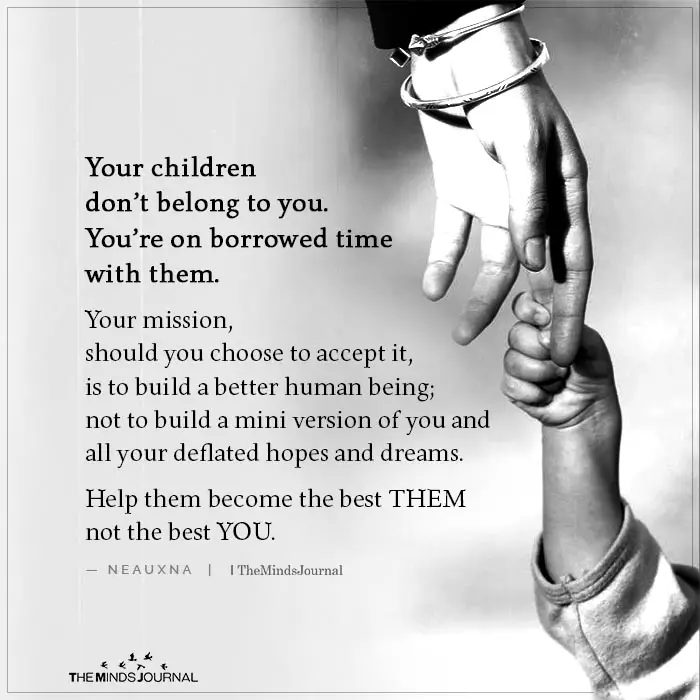
12. The Helicopter Parent
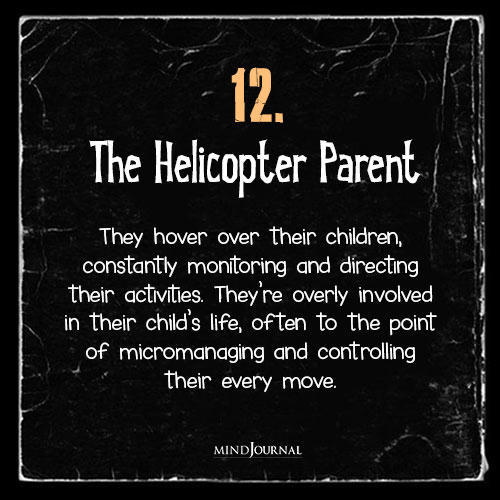
Helicopter parenting is a style where parents hover over their children, constantly monitoring and directing their activities. These parents may be overly involved in their child’s life, often to the point of micromanaging and controlling their every move.
Helicopter parents may be well-intentioned, wanting to protect their kids from harm and ensure their success. However, this style of parenting can have negative consequences on a child’s development, such as a lack of independence, self-esteem, and decision-making skills.
Children of helicopter parents may struggle with decision-making and taking initiative, as they have become accustomed to their parents making decisions for them. Additionally, they may develop anxiety and a fear of failure, as they have been shielded from disappointment and negative consequences.
Related: 60+ Quotes About Selfish Parents That’ll Help You Cope Better
13. The Volatile Parent
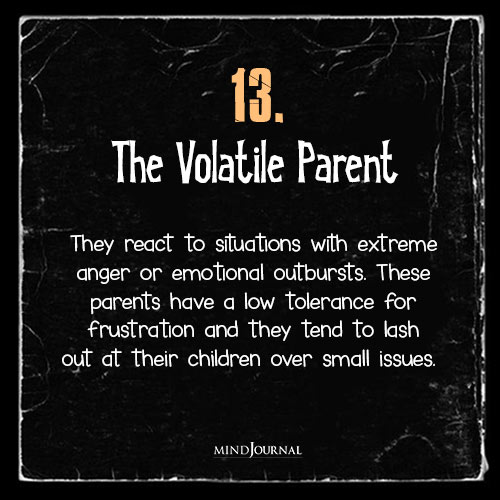
This is easily one of the most poisonous types of toxic parents.
The explosive or volatile parent is one who reacts to situations with extreme anger or emotional outbursts. These parents may have a low tolerance for frustration and may lash out at their children over small issues. This type of behavior can have negative consequences on a child’s emotional and psychological well-being.
Children of explosive parents may feel unsafe and may develop anxiety or depression. They may also have difficulty regulating their own emotions and may struggle with forming healthy relationships.
Every disagreement and argument ends up turning into screaming and shouting, and with explosive and volatile parents, normal conversations are a rarity.
14. The “Parentified” Parent
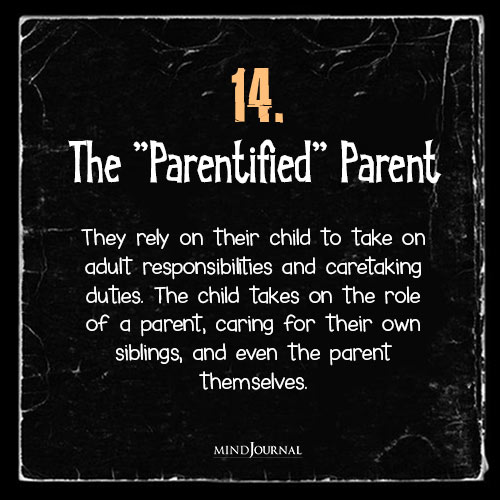
The parentified parent is one of those types of toxic parents who relies on their child to take on adult responsibilities and caretaking duties.
These parents may struggle with their own emotional or psychological issues, and as a result, may not be able to provide the appropriate care for their children. This can cause the child to take on the role of a parent, caring for their own siblings, and even the parent themselves.
Children of parentified parents may experience significant emotional and psychological distress, as they are robbed of their childhood and forced to take on adult responsibilities.
They may also experience a sense of guilt or responsibility for their parent’s well-being and may struggle with forming healthy and meaningful adult relationships in the future.
15. The Hypocrite Parent
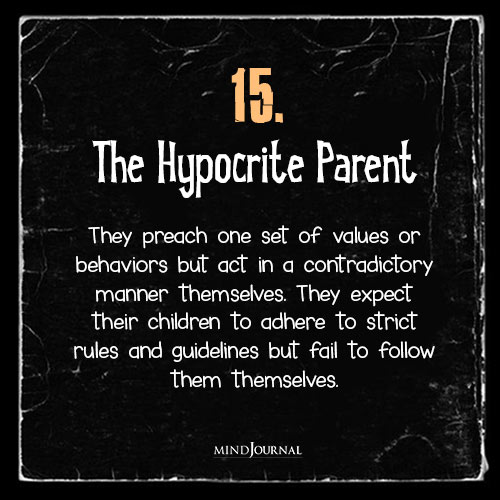
Another major example of toxic parenting is this. Hypocritical parents are probably one of the most toxic parents out there.
They preach one set of values or behaviors but act in a contradictory manner themselves. They expect their children to adhere to strict rules and guidelines but fail to follow them themselves. This can cause confusion and distrust in their children, who may struggle to reconcile their parent’s words with their actions.
Children of hypocritical parents may experience significant emotional and mental distress and confusion, as they feel betrayed and uncertain about the authenticity of their parent’s values and beliefs.
They may also struggle with developing their own sense of morality and may be more likely to engage in deceptive behaviors themselves while growing up.
Related: 6 Kinds of Emotional Abuse by Narcissistic Parents
16. The Infallible Parent
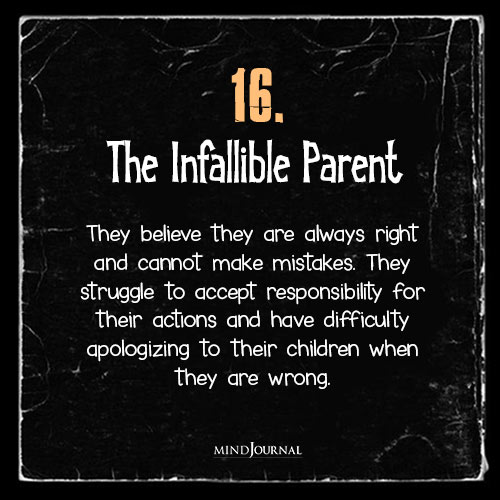
One of the most common types of toxic parents is this.
The infallible parent is one who believes they are always right and cannot make mistakes. They struggle to accept responsibility for their actions and have difficulty apologizing to their children when they are wrong. This can lead to a lack of accountability and may cause tension and conflict within the family.
Children raised by infallible parents end up feeling invalidated and unheard, as their opinions and perspectives are always dismissed by their parents. They also struggle with developing their own sense of autonomy and feel incapable of making decisions for themselves.
Their self-esteem and self-worth take a massive hit because of this, and they spend their entire lives picking up the pieces of their self-confidence.
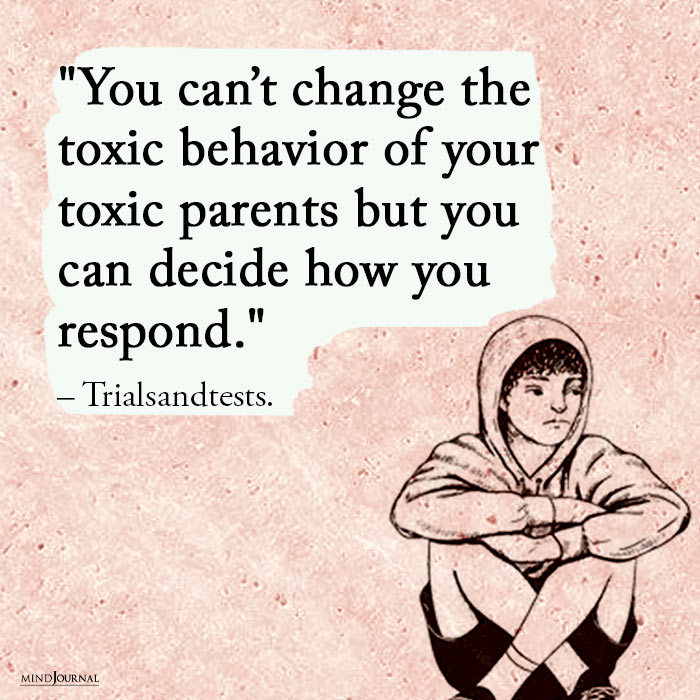
Dealing with Toxic Parents
Dealing with toxic parents can be challenging, but it is essential to protect yourself from their harmful behavior.
Some effective tips for dealing with toxic parents are the following:
- Set strict personal boundaries: Establish clear boundaries and communicate them with your parents. Let them know what behavior is acceptable and what is not.
- Rely on your loved ones: Surround yourself with supportive friends and family members who can provide emotional support.
- Seek professional help: Consider seeking the help of a therapist or counselor who can help you deal with the emotional trauma caused by toxic parents.
- Practice self-care: Take care of yourself by eating a healthy diet, exercising regularly, and engaging in activities that bring you joy.
- Limit contact: If necessary, limit contact with toxic parents or cut off contact entirely if their behavior is causing significant harm.
Takeaway
Toxic parents can have a significant impact on your life, leading to emotional, psychological, and physical issues. Recognizing their toxic behavior and setting boundaries is essential for protecting yourself from their harmful actions.
Related: Emotionally Immature Parents: 7 Signs You Were Raised By One
Seeking professional help and surrounding yourself with supportive people can also help you heal from the emotional trauma caused by toxic parents. Remember that you deserve to be treated with respect and love, and it is okay to prioritize your well-being over toxic relationships.
Frequently Asked Questions (FAQs)
What happens to children of toxic parents?
Children of toxic parents often grow up with emotional wounds and psychological scars. They may struggle with low self-esteem, anxiety, depression, and trust issues. These effects can persist into adulthood and impact their relationships, career, and overall well-being.
What is the most harmful parenting style?
The most harmful parenting style is probably authoritarian parenting, where strict rules and harsh punishments are imposed without explanation or negotiation. Children raised by authoritarian parents develop low self-esteem, anxiety, and depression, as well as exhibit rebellious or aggressive behavior.
What are Unicorn parents?
Unicorn parents prioritize their child’s happiness and well-being over other considerations, such as discipline or structure. They are generally very supportive of their children’s dreams, desires, and goals, and try to create a nurturing environment so that they can grow.
What is a hummingbird parent?
A hummingbird parent emphasizes being nurturing and supportive while also allowing children to explore and make mistakes. It is based on the concept of “hovering nearby” like a hummingbird, providing guidance and support without being overbearing.
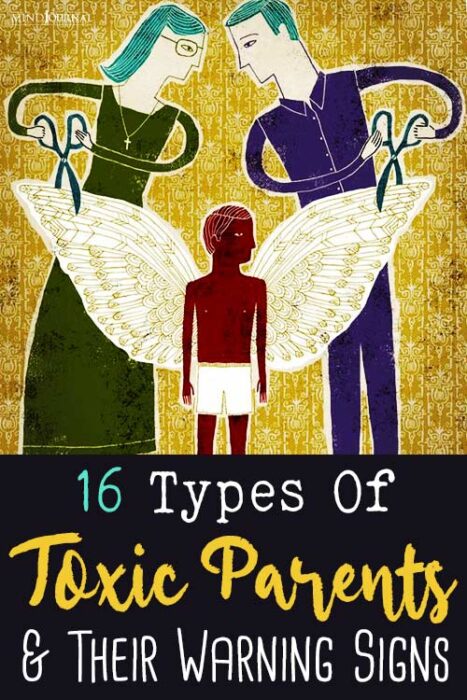
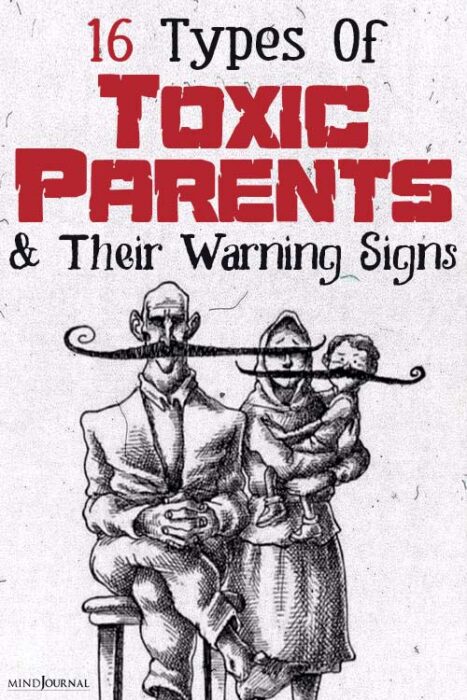
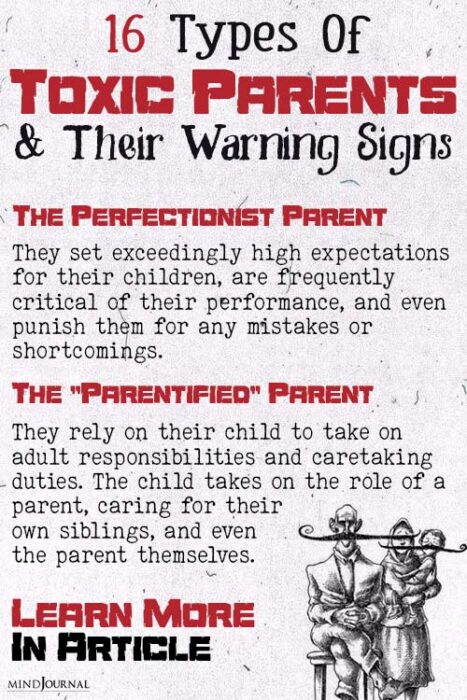
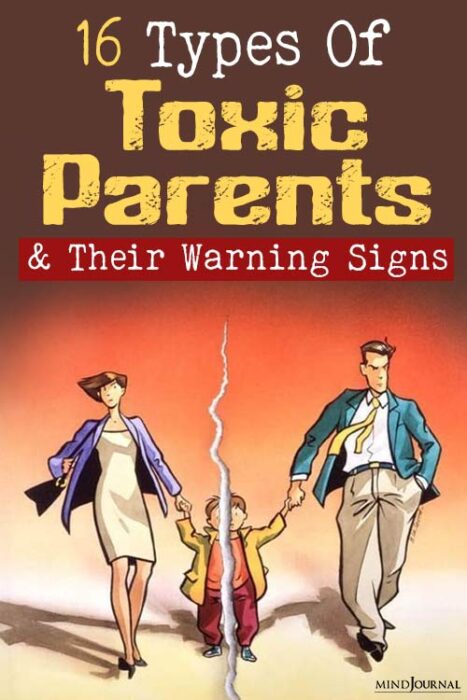
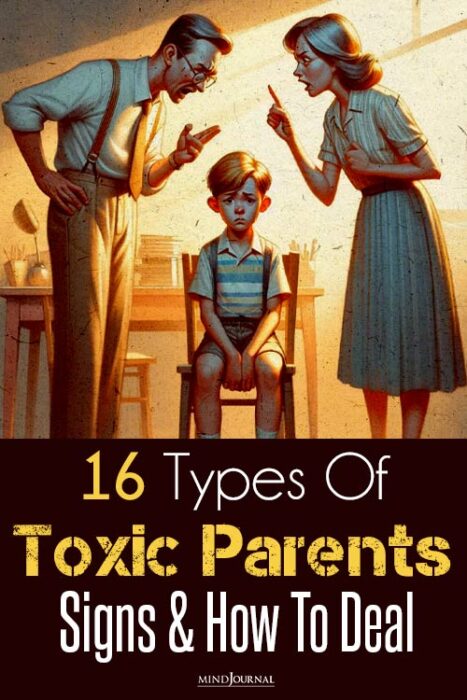
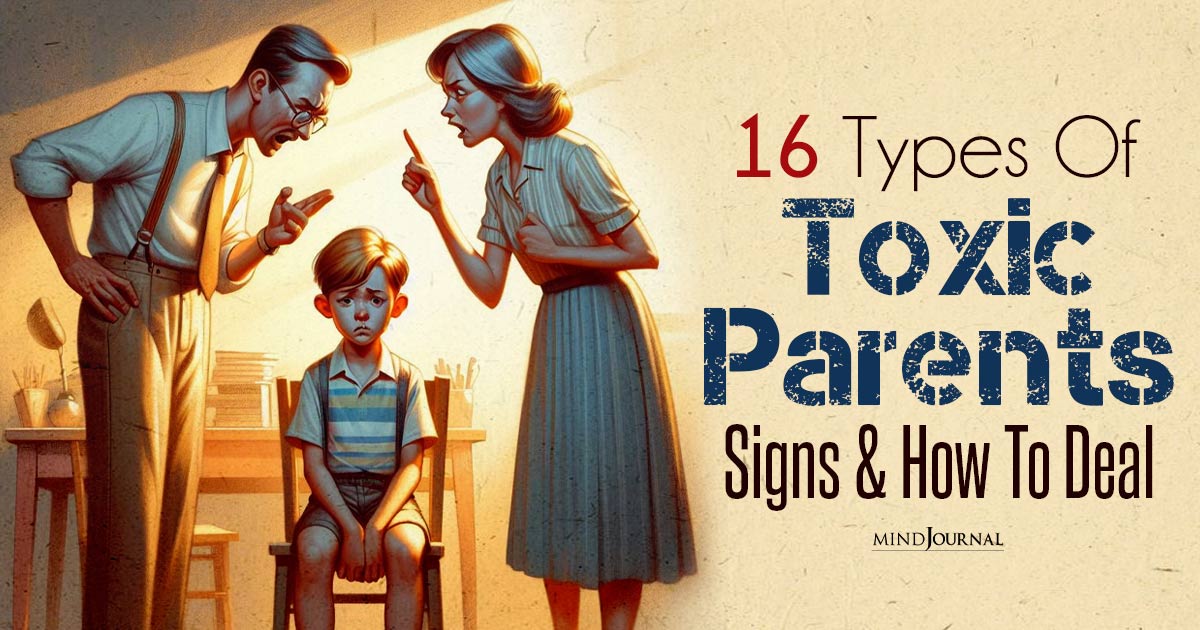







Leave a Reply
You must be logged in to post a comment.